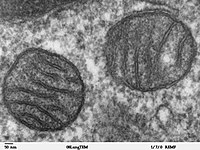
Photo from wikipedia
BACKGROUND Mitochondrial diseases are a clinically heterogeneous group of rare hereditary disorders that are defined by a genetic defect predominantly affecting mitochondrial oxidative phosphorylation. Mitochondrial diseases are caused by mutations… Click to show full abstract
BACKGROUND Mitochondrial diseases are a clinically heterogeneous group of rare hereditary disorders that are defined by a genetic defect predominantly affecting mitochondrial oxidative phosphorylation. Mitochondrial diseases are caused by mutations of genes encoded by either nuclear DNA or mitochondrial DNA. Hundreds of different mitochondrial DNA point mutations and large-scale mitochondrial DNA rearrangements have been shown to cause mitochondrial diseases including Kearns-Sayre syndrome, Leber's hereditary optic neuropathy, Leigh syndrome, myoclonic epilepsy with ragged-red fibers, mitochondrial encephalopathy lactic acidosis stroke. AIMS To investigate new variants that could be associated with mitochondrial diseases and to determine the effect of mitochondrial DNA mutations on the clinical spectrum. STUDY DESIGN Cross-sectional study. METHODS We screened whole mitochondrial DNA genome using next-generation sequencing in 16 patients who are considered to have mitochondrial disease.CentoGene and Mikrogen Genetic Diseases Diagnostic Center's database were used to investigate sequence variants. Detected variants were evaluated in bioinformatic databases to determine pathogenicity and were classified as class 1 (pathogenic), class 2 (likely pathogenic), and class 3 (variant of uncertain significance) according to CentoGene-ACMG database. RESULTS As a result of the study, 2 patients were diagnosed with Leigh syndrome as previously reported class 1 mutations in MT-ATP6 and MT-ND5 genes. Four variants were identified for the first time in literature and 2 variants, previously reported but with uncertain pathogenic effect, are thought to be associated with mitochondrial disease. CONCLUSION Mitochondrial DNA screening should be among the primary clinical tests in patients with suspected mitochondrial disease to rule out DNA-associated mutations.
Journal Title: Balkan medical journal
Year Published: 2021
Link to full text (if available)
Share on Social Media: Sign Up to like & get
recommendations!